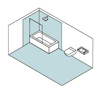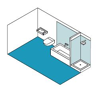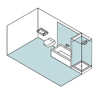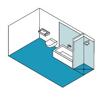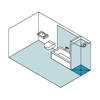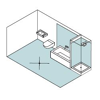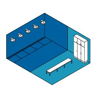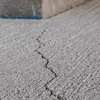
Composite waterproofing with slabs and tiles
-
Standards for composite waterproofing
-
Planning and execution principles
Waterproofing systems for all load classes
Advantages and properties of composite waterproofing
Protection against moisture
Remmers composite waterproofing systems provide long-term and reliable protection against water and damp for the building surface and the structure below.
Individual
We offer the perfect system for every scenario, as well as a wide range of colours for an individual finish.
Tested safety
In addition to meeting the requirements of the applicable standards, Remmers waterproofing products also undergo additional testing that vouches for their high quality.
Service
From technical matters to customer service, Remmers is on hand to answer any questions you may have about waterproofing. Need oursupport? Get in touch!
Waterproofing for indoor applications
DIN 18534 gives planners and developers a set of rules for waterproofing floor and wall surfaces in indoor applications with a planned backwater height of up to 10 cm.
Within the meaning of this standard, indoor applications refers to surfaces that are exposed to splash water, service water or cleaning water. This is the case, for example, in bathrooms, commercial kitchens, and areas around swimming pools or shower facilities. The standard also covers production and commercial areas.
The waterproofing material must be chosen and designed in consideration of these impacts. As a general principle, the planning stage should also include an analysis of the suitable waterproofing types for the specific case in hand. Annex B of the standard provides a guide that includes criteria for selecting the right type of waterproofing.

Impacts on components in interiors
-
Water impact classes
-
Mechanical effects arising from the substrate
Choosing suitable waterproofing
Important:The waterproofing product requires either an ETA on the basis of ETAG 022 or a general building inspectorate test certificate according to PG-AIV-F. Furthermore, the waterproofing material should be tested according to DIN EN 14891. To avoid defects even where there is no damage, the composite waterproofing must be implemented in the tested system. Details of the permitted system components in each case, such as tile cement, joint tape or reinforcement fabric, can be found in the test certificate of the waterproofing product.
- The waterproofing material is to be applied in two layers, regardless of its type. In the case of polymer dispersions, the two waterproofing layers must also be created in contrasting colours
- For water impact class W3-I (very high), the checking of the layer thickness must be documented
- When waterproofing floors, the waterproofing must be extended at least 5 cm up adjacent wall surfaces, as well as behind the frames around doors
- Silicone sealants are not a replacement for waterproofing! Areas under or behind tubs are to be protected accordingly by continuing the waterproofing or, alternatively, by using tub sealing tape
- For floor drains and channels as well as built-in parts, the flange width must be at least 50 mm; this does not include water impact classes W0-I to W2-I, for which 30 mm is sufficient

Waterproofing balconies and walkways
Part 1: Non-utilized and utilized roofs – Requirements and principles for execution and design
Part 2: Non-utilized and utilized roofs – Materials
Part 3: Non-utilized and utilized roofs – Selection, execution and detailing
Part 4: Non-utilized and utilized roofs – Maintenance
Part 5: Balconies and walkways
For the waterproofing of balconies and walkways, the standard is limited to the use of liquid-applied and sheet waterproofing materials. The waterproofing in combination with tiles and slabs can in turn only be carried out with liquid-applied waterproofing materials. It is also permitted to use crack-bridging, mineral waterproofing slurries (CM for short), as well as reaction resins (RM for short).
In addition, the standard sets specific requirements for the waterproofing system: For instance, the waterproofing material must be tested in accordance with the European DIN EN 14891 standard and bear the CE mark. The adhesives required for applying the tiles or slabs must be tested in the system and specifically named on the test certificate according to DIN EN 14891. It is not permitted to select an arbitrary combination of waterproofing material and tile adhesive for the composite waterproofing.
In contrast to the waterproofing standard for interiors, DIN 18531 does not define any specific water impact classes. Rather, it is assumed that there is a generally high exposure to precipitation water with temporary puddle formation.
Classifying tile cements
As a component of the composite waterproofing, not only must the tile adhesive used be tested in the system with the waterproofing material (verification via general test certificate), it must also fulfil further requirements.
DIN 18531-5 specifies for waterproofing in combination with tiles and slabs that the tile adhesive must be tested according to DIN EN 12004 and that cementitious tile adhesives must also comply with at least class S1.
The classification for tile adhesives results from the European standards DIN EN 12004 and DIN EN 12002, according to which all tile adhesives traded in Europe must be tested and provided with the corresponding CE marking. The classes are categorised as follows:
-
Type of tile adhesive
-
Test of adhesive strength
-
Application characteristics
-
Deflection
Peace of mind guaranteed
Benefit from our expert advice, our promise of optimum safety for our extensive product range, and our express delivery service.
Express delivery
Our express delivery is the ideal service for anyone who needs their order to be delivered fast.
Specialist representatives directly on site
Our specialist representatives are on hand to provide you with personalised support and advice – wherever you are.
Extensive product range
From building and floor protection products through to wood preservatives, we have everything you need!
Systems with Remmers guarantee
You can be sure of a reliable and high-quality solution for every application.


